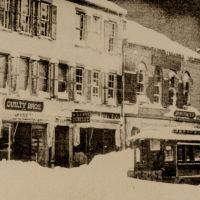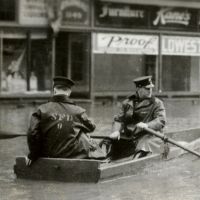Primary Source
Nan Turner Waldron was living on Cape Cod during the Blizzard of '78; she remembered her terrifying drive home from work on the first day of the storm.
Nowadays bad weather is simply an inconvenience which seldom interrupts our daily routines – so we tune in the storm alert system and tune out our senses. Naturally, I, like thousands of others on Monday the 6th [1978], got into my car to carry on business as usual. I drove to work watching flags on buildings whipping crazily in a sleeting east wind, trying to convince myself that the "real" storm wouldn't arrive until afternoon, as predicted.
I had lived my entire life on the New England coast and I knew that this wind was unnaturally wild. My inner voice kept telling me to return home, yet lunch with a friend was an important goal. By the time I started home in the afternoon, it was already too late for safe driving. Thousands of us inched along the highways through the storm, hour after hour, never certain of our location, intent only on keeping the car moving through rapidly accumulating and drifting snow. Bundled in every piece of clothing I had stored in the car, my senses switched to high alert. I felt as if I were transported into the wilds….
Nothing about this storm seemed ordinary. The sound was different from that of any other – a deep belly howl with the voice of doom – full, long, and deafening. Great gusts bore down like roaring freight trains sweeping over the car from the east, then a sudden silence as if the amplifiers had been turned off, a vacuum of silence created by the speed of the wind. At one point I got out of the car to ask a truck driver beside me whether we were near the train station where I hoped to turn off. We were not. It was only the wind mimicking a diesel engine.
The appearance was different. The snow came down so hard and fast that I couldn't think whether or not it was lovely – it was just white – and the wind certainly was not grateful! No reference points were visible, the whole world was white! I was flying blind, trying to keep track of distance and maintain some sense of direction, watching for cars around me and creating mental pictures of buildings I could not see in case I had to leave the car and walk to safety.
And it was becoming cold – very cold. I didn't dare turn on the heater or the radio. Traveling no more than five miles per hour, I was afraid the battery might fail. Now that I rethink my actions, I am amazed at the intensity of focus I was able to maintain. The will to survive takes command, indeed. There was no time to be frightened with all the senses riveted on handling the car and picking points of reference. I kept thinking, "I can walk if I have to." Later, when I finally reached home, I found that it would have been impossible to go even a short distance in the drifting snow. Exhaustion would have overtaken me.
From Journey to the Outermost House, by Nan Turner Waldron (Butterfly & Wheel, 1991). Used by permission.








